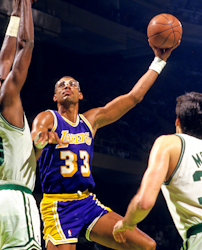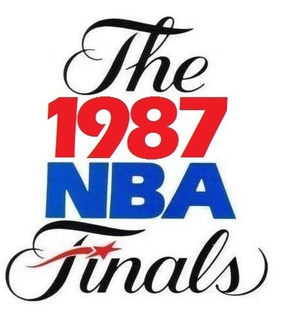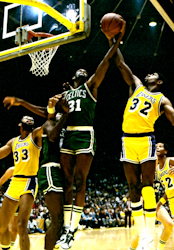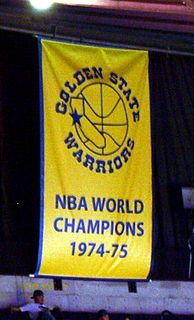
Kareem Abdul-Jabbar is an American former professional basketball player who played 20 seasons in the National Basketball Association (NBA) for the Milwaukee Bucks and the Los Angeles Lakers. During his career as a center, Abdul-Jabbar was a record six-time NBA Most Valuable Player (MVP), a record 19-time NBA All-Star, a 15-time All-NBA Team member, and an 11-time NBA All-Defensive Team member. He was a member of six NBA championship teams as a player and two more as an assistant coach, and was twice voted NBA Finals MVP. He was named to three NBA anniversary teams. Widely regarded as one of the greatest players of all time, often named a top 3 player in NBA history, he was called the greatest basketball player of all time by Pat Riley, Isiah Thomas, and Julius Erving.
The New York Renaissance, also known as the Renaissance Big Five and as the Rens, was an all-black professional basketball team established February 13, 1923, by Robert "Bob" Douglas in agreement with the Renaissance Casino and Ballroom. The Casino and Ballroom at 138th Street and Seventh Avenue in Harlem was an entertainment complex including a ballroom that served as the Big Five's home court. Following each game, a dance took place. The success of the Rens shifted the focus of black basketball from amateur teams to professional teams. Initially, the Rens played mostly in Harlem, but by the end of the 1920s, as attendance began to dwindle, the team could be found more often playing on the road, barnstorming across the country out of necessity. The Renaissance are also the topic of the 2011 documentary On the Shoulders of Giants.

The center (C), or the centre, also known as the five, is one of the five positions in a regulation basketball game. The center is normally the tallest player on the team, and often has a great deal of strength and body mass as well. In the NBA, the center is typically close to 7 feet (2.13 m) tall. They traditionally play close to the basket in the low post.

The 1989 NBA Finals was the championship round of the 1988–89 National Basketball Association (NBA) season, and the conclusion of the 1989 NBA Playoffs. The series was a rematch of the previous year's championship round between the Eastern Conference playoff champion Detroit Pistons and the defending NBA champion and Western Conference playoff champion Los Angeles Lakers. This, along with the 1983 NBA Finals, were the only two NBA championships of the 1980s not to be won by either the Lakers or the Boston Celtics; every NBA Finals of that decade featured either the Lakers or Celtics, and sometimes both. Coincidentally, the Lakers were also swept in the 1983 NBA Finals, that time by the Philadelphia 76ers.

The 1987 NBA Finals was the championship round of the National Basketball Association (NBA)'s 1986–87 season, and the culmination of the season's playoffs. The Western Conference champion Los Angeles Lakers defeated the Eastern Conference and defending NBA champion Boston Celtics 4 games to 2. The key moment of the series was Magic Johnson's baby sky hook in Game 4. This was the tenth time that the Celtics and Lakers met in the NBA Finals. It would be the Celtics' last Finals appearance until the two teams met in 2008.

The 1985 NBA World Championship Series was the championship round of the National Basketball Association (NBA)'s 1984–85 season, and the culmination of the season's playoffs. It featured the defending NBA champion and Eastern Conference playoff champion Boston Celtics against the Western Conference playoff champion Los Angeles Lakers.
The 1982 NBA World Championship Series was the championship round of the National Basketball Association (NBA)'s 1981–82 season, the top level of competition in men's professional basketball in North America. The series saw the Western Conference champion Los Angeles Lakers face the Eastern Conference champion Philadelphia 76ers. It was a rematch of the 1980 NBA Finals. The Lakers won 4 games to 2.
The 1980 NBA World Championship Series was the championship round of the National Basketball Association (NBA)'s 1979–80 season, and the conclusion of the season's playoffs. The Western Conference champion Los Angeles Lakers defeated the Eastern Conference champion Philadelphia 76ers 4 games to 2.
The 1975–76 NBA season was the 30th season of the National Basketball Association. The season ended with the Boston Celtics winning the NBA Championship, beating the Phoenix Suns 4 games to 2 in the NBA Finals.

The 1974–75 NBA season was the 29th season of the National Basketball Association. The season ended with the Golden State Warriors winning the NBA Championship, sweeping the Washington Bullets 4 games to 0 in the NBA Finals.
The 1973–74 NBA season was the 28th season of the National Basketball Association. The season ended with the Boston Celtics winning the NBA Championship, beating the Milwaukee Bucks 4 games to 3 in the NBA Finals.
Black Fives is a trademarked term, federally registered in the United States Patent & Trademark Office, that refers to the all-Black basketball teams that existed in the United States between 1904, when the game was first introduced to African Americans on a wide-scale organized basis, and 1950, when the NBA signed its first Black players. The period is known as the "Black Fives Era" or "Early Black Basketball" or simply "Black Basketball."
The 1974 NBA World Championship Series was the championship round of the 1973–74 National Basketball Association (NBA) season. The Eastern Conference champion Boston Celtics defeated the Western Conference champion Milwaukee Bucks 4 games to 3 to win the NBA championship. This was the last time the Boston Celtics won a game 7 on the road until 2022, when the Boston Celtics defeated the Miami Heat in game 7 of the Eastern Conference Finals in Miami.

The 1985 NBA playoffs was the postseason tournament of the National Basketball Association's 1984–85 season. The tournament concluded with the Western Conference champion Los Angeles Lakers defeating the Eastern Conference champion Boston Celtics 4 games to 2 in the NBA Finals. Kareem Abdul-Jabbar was named NBA Finals MVP for the second time.
The highlight of the Los Angeles Lakers season of 1979–80 was the 20-year old rookie Magic Johnson leading the Lakers to their seventh NBA Championship, defeating the Philadelphia 76ers led by Julius Erving in six games in the NBA Finals. This was also the team's first season under the ownership of Jerry Buss. Magic's season represented the birth of the Showtime Lakers.
The 1985–86 Los Angeles Lakers season was the 40th season of the franchise, 38th in the National Basketball Association (NBA) and 26th in Los Angeles. The Lakers entered the season as the defending NBA champion, having defeated the previous NBA champion and rival Boston Celtics in the 1985 NBA Finals in six games, having finally defeated the Celtics in the NBA Finals after having lost to them 8 consecutive times in the championship series. The Lakers looked to repeat as NBA Champions, after sweeping the San Antonio Spurs in three games in the First Round, and then defeating the Dallas Mavericks in six games in the Semi-finals in the playoffs, but were unable to defend their title, as they lost to the Houston Rockets in the Conference Finals in five games after winning the first game, but proceeded to lose the following four. The Rockets would go on to lose to the Boston Celtics in the NBA Finals in six games.
The 38th National Basketball Association All-Star Game was played on February 7, 1988, at Chicago Stadium in Chicago. The East won the game 138-133 and Michael Jordan was named the NBA All-Star Game Most Valuable Player (MVP).
Power Memorial Academy (PMA) was an all-boys Catholic high school in New York City that operated from 1931 through 1984. It was a basketball powerhouse, producing several NBA players including Kareem Abdul-Jabbar, Len Elmore, Mario Elie, Chris Mullin, as well as NBA referee Dick Bavetta and a record 71-game winning streak. Its 1964 basketball team was named "The #1 High School Team of The Century".
The 1983–84 season for the Los Angeles Lakers saw them lose in the 1984 NBA Finals against Larry Bird's Boston Celtics in seven well-fought games. The Lakers were coming off of an NBA Finals loss the previous season to the Julius Erving and Moses Malone-led Philadelphia 76ers, in which they were swept in four games. The Lakers, powered by Kareem Abdul-Jabbar and Magic Johnson with his 13.1 assists per game, ended up winning 54 games in the 1983–84 NBA season. On April 5, 1984, Kareem Abdul-Jabbar had a 12-foot shot over Mark Eaton of the Utah Jazz to surpass Wilt Chamberlain as the NBA's all-time leading scorer with 31,421 points.
The 1983–84 NBA season was the Jazz's tenth season in the NBA and its 4th in Utah. The Jazz averaged 115.0 points per game while allowing an average of 113.8 points per game. It was their first playoff appearance in franchise history.







